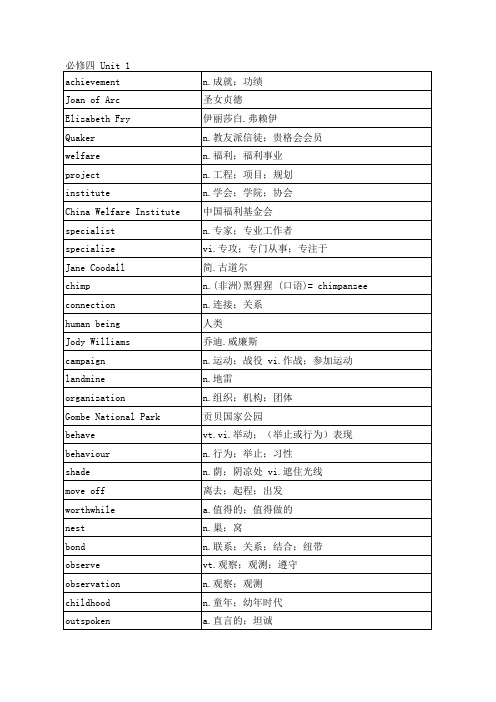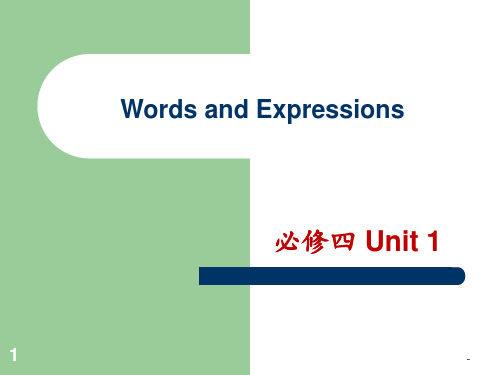高中英语人教版必修四Unit1单词讲解-精选.pdf
人教版高中英语单词表必修四unit 1

必修四 Unit 1 achievement Joan of Arc Elizabeth Fry Quaker welfare project institute China Welfare Institute specialist specialize Jane Coodall chimp connection human being Jody Williams campaign landmine organization Gombe National Park behave behaviour shade move off worthwhile nest bond observe observation childhood outspoken n.成就;功绩 圣女贞德 伊丽莎白.弗赖伊 n.教友派信徒;贵格会会员 n.福利;福利事业 n.工程;项目;规划 n.学会;学院;协会 中国福利基金会 n.专家;专业工作者 vi.专攻;专门从事;专注于 简.古道尔 n.(非洲)黑猩猩 (口语)= chimpanzee n.连接;关系 人类 乔迪.威廉斯 n.运动;战役 vi.作战;参加运动 n.地雷 n.组织;机构;团体 贡贝国家公园 vt.vi.举动;(举止或行为)表现 n.行为;举止;习性 n.荫;阴凉处 vi.遮住光线 离去;起程;出发 a.值得的;值得做的 n.巢;窝 n.联系;关系;结合;纽带 vt.观察;观测;遵守 n.观察;观测 n.童年;幼年时代 a.直言的;坦诚
respect argue argument entertainment lead a...life crowd crowd in inspire inspiration support look down upon/on e across career rate sickness intend emergency generation determination kindness considerate consideration deliver carry on modest
高中英语人教版必修四unit1单词

43.n. 事业;生涯 44.n. 比率;速度 45.n. 疾病;恶心 46.vt. 计划;打算 47.n. 突发事件;紧急情况 49.n. 一代;一辈 50.n. 决心;果断
career rate sickness intend emergency generation determination
今 天学习不努力,明天努力找工作
1. n. 成就;功绩
2. n. 教友派信徒;贵格会会 员
3. n. 福利;福利事业 4. n. 项目;工程;规划 5. n. 学会;学院;协会 6. 中国福利基金会 7. n. 专家;专业工作者
achievement Quaker
welfare project institute China Welfare Institute specialist
29.n. 争论;争辩;争吵
argument
30.n. 款待;娱乐;娱乐表演
entertainment
31过着……的生活
lead a … life
32.n.人群;观众 vt. 挤满;使拥挤 crowd
33.(想法、问题等)涌上心Fra bibliotek; crowd in
34.vt. 鼓舞;激发;启示
inspire
35.n. 灵感;鼓舞
51.n. 仁慈;好意
kindness
52.adj. 考虑周到的
considerate
53.n. 考虑;体谅
consideration
54.vt. 递送;生(小孩儿);
接生;发表(演说等)
deliver
55.继续;坚持
carry on
56. adj. 谦虚的;谦让的;适 modest 度的
人教版高中英语必修四unit1-单词(共23张PPT)

r_e__s_p_e__c_t_fu_sltudent.
2 The two friends said goodbye and went their
r_e_s_p__e_c_t_i_v_e_ ways.
__________ __________ __________ we are very fortunate.在这方面我们是很幸运的。
12. look down upon/on 蔑视,瞧不起
(3)give one’s respects to sb. 向某人致意
in some respects 在某些方面 in every respect/in all respects 在各方面
即学即练 respectable respectful respective
1 Our Chinese teacher was so r_e_s_p__e_c_t_a_b__le that I
crowd in/into sp.涌入/挤进某场所
拓展 (1)_c_ro_w__d_e_d_ adj.
(2)球赛结束后,人群为胜利而欢呼。 After the football match,__t_h_e_c_r_o_w__d cheered the winning. (3)一大群人在那里围观。
_A__c_r_o_w_d__o_f_p_e_o_p_l_e____ were looking on. (4)房间挤满了客人。 The housei_s_c_r_o_w_d_e_d__w_i_th__g_u_e_s_t_s_. (5)他从来不随大流。
The meeting is________ ________ ________the plan for building a new swimming pool.
人教版英语必修四-Unit-1单词详解PPT课件

/adj./考虑周到的
consideration /n./考虑
in consideration of...考虑到……,顾及……
她深爱她的家庭。
7
-
5.whorthwile /adj./
值得的,值得做的
辨析 worthwhile/worth/worthy
worthwhile (可作定语和表语)
a worthwhile experiment
The experiment is worthwhile.
It is worthwhile to do sth./ doing sth.
He devotes himself to finishing the task.
She devotes all her time to her family.
2) devoted (adj.) 深爱的,全心全意的,忠实的
a devoted friend
She is devoted to her family.
2
-
2. campaign /n./ 运动;战役; /v./作战
a campaign for 为了……的运动
a campaign against 反对……的运动
eg.
They started a campaign for equal rights.
他们发起了一项争取平等权利的运动。
(2) vi. 参加运动;作战;
be worthy of being done.
=be worthy to be done. The job is worthy of being done.
人教课标版高中英语必修4 Unit1_Learning_about_Language_重难点词汇详解

Unit1 Leaning about Language重难点词汇详解重点词汇1. look down upon/on蔑视;瞧不起教材原文Many people look down upon poor people. 很多人看不起穷人。
经典例句①She looks down upon people who haven't been to college.她瞧不起没上过大学的人。
②"look down upon this act and will not eat at McDonald's again, "he said. 他说:“我鄙视这种行为,以后再也不在麦当劳吃东西了。
”③Passersby simply looked on as he was attacked.他被袭击时,路人只是旁观。
④I look up to him because he's a real artist.我尊敬他,因为他是一位真正的艺术家。
2. refer to 查阅;参考;谈到教材原文If the word group refers to different members, use a plural verb. 如果单词“group”指不同成员,那么动词用复数形式。
经典例句①Don't refer to this matter again, please. 请不要再提这件事了。
②They referred to this kind of art as minimal art.他们把这种艺术叫作微型艺术。
③If he gives you any more trouble, refer him to me.如果他再找你麻烦,叫他来找我。
温馨提示refer的过去式和过去分词,以及现在分词都要双写字母r(referred/referring)。
结构详解1. seem 后面接动词不定式的用法seem to do 似乎做……seem后接动词不定式的用法seem to be doing 似乎正在做. ……seem to have done 似乎已经做了……教材原文The audience seem/seems to have enjoyed the concert. 观众们好像喜欢这场音乐会。
人教高中英语必修4 Unit1 Vocabulary (共21张PPT)

3.动词天天见
1.behave vt. behave well/badly/properly
2.respect vt./ n. show respect for sb
3.observe vt. 观察 遵守
argue with sb. about sth.
4.argue v.
支持 供养
5.support vt. /n.
9. He comes across an old classmate last night.
改错
四、运用新单词
A great woman—my mother
• Yesterday was Mother’s Day, and I intended to show my respect for my mum.
人教版高中英语必修四
Unit 1
Vocabulary
一、导入(Lead in)
Hi, have you memorized English words today?
How do you learn English words?
二、学习新词汇
1. 名词来看图
shade n.
阴凉处
They are playing in the shade of a tree.
look down on
move off shade
crowd in
intend
五、作业滚滚来
1.Finish the chart。 2. Write down a great woman in your mind with the words we have learnt today.
Enjoy English , Enjoy word study, Enjoy life!
高中英语必修四UNIT1
6. shade sb.为某人提供荫凉in the shade of the tree 在阴凉下put …in the shade 使…逊色、黯然失色 eg: She is so beautiful that she puts her sister in the shade.7. 比较:@worthwhile 值得的eg:It ’s worthwhile to visit the ZhengDing middle school.(作表语)@worth 价值be (well) ~ (doing ) sth.eg: The place is worth visiting/a visit.@worthy 有价值的;值得的eg:The place is worthy of being visited/a visit/to be visited.a worthy man 一个值得尊重的人7.inspire sb. 赋予某人灵感inspired 受到鼓舞的;有灵感的inspiring 令人鼓舞、振奋人心的8. campaign 运动;战役9. campaign forcampaign againstcampaign to do sth.为…而斗争launch campaign 发起运动10. intend to do sth.打算做某事intend sb. to do sth. 打算让某人做某事intend to have done 本想做某事(而没能做)=have intended tobe intended to do sth. 为了做…be intended for …为…而…(表目的)had intended to do sth. 原打算做某事intend + that + 虚拟语气eg: We intended that the project (should)be finished at the end of he month.be intended as … 被作为…而用eg:These special signs are intended as aguide to the blind.11. connection 联系;关系a connection between A and BA 和B 的关系have a direct/close/strong connectionwith …和…有(…)的关系in connection with …关于…;有关…be connected with …把…联系起来;给…接通电话;连接 12. be ashamed of …因…而感到羞愧13. argue with sb. about/over sth. 因某事和某人辩论argue that…主张,认为…argue for/against为支持/反对..而辩论argue sb. into/out of doing sth.说服某人做/不做某事14.work out 理解;说出;判断;发展进行;解出、算出;制定、拟定15.crowd in (on sb.)/crowd into one’smind/head 涌上心头、涌入脑海crowd into…大量涌入(狭小的空间)16.drive …out of …把…赶出…drive sb. to do 迫使某人去做某事drive sb.+adj/介词短语使某人…eg: You will drive me mad.17.marn sb. of/about…警告某人…warn sb. against+n./代词提防…别…warn sb. to/not to do sth. 告诫/提醒某人(不)做某事18.look down on/open…藐视,瞧不起.. look up to sb for sth. 因…而尊重某人19.refer to 提及,谈到;查阅、参阅refer to…as..把…称作…;认为…是…20.take consideration into…考虑到…体谅…be under consideration 在考虑中;在审议中give consideration to…=give…consideration 考虑某事out of consideration for…出于对…的关心/体谅show consideration for sb./sth 体谅;关心…20.deliver sb. of a baby 为某人接生21.be delivered of a baby生小孩deliver a/an speech/lecture/talk/addres 发言;授课;讲话22.It hits sb. that=It occurs to sb.=Itstrikes sb. that…突然想到…It happens that…碰巧…四.课文美句1.However , the evening makes it allworthwhile.2.Only after her mother came to helpher for the first few months was she allowed to begin her object.3.She has argued that wild animalsshould be left in the wild and not used for entertainment oradvertise-ments.4.She inspires those who want to cheerthe achievements of women.5. Further reading made me realize that it was hard work and determination as well as her gentle nature that got her into medical school.6. She actually observed chimps as a group hunting a monkey and then eating it.五.语法项目@主谓一致I.要点谓语受主语支配,须和主语在人称和数上保持一致,这叫做主谓一致,主谓一致包括语法一致、意义上一致和就近一致。
Unit 1 重点单词讲解课件 高中英语选择性必修第四册
3.ambition n.追求的目标;夙愿;野心;雄心;志向;抱负 ambitious /æmˈbɪʃəs/ adj.雄心勃勃的;有野心的;有雄心 的;费力的;耗资的;耗时的
I had the ambition, but not the resources. 我有自己追求的目标,但缺乏资源。 It had been her lifelong ambition.这是她终身追求的目 标。
20.numerous /ˈnjuːmərəs/ adj.很多的;众多的;许多的 There are numerous products designed to keep your child safe. 有很多的产品设计,让您的孩子安全。 His views have been expressed in numerous speeches. 他已在无数次发言中表达了自己的观点。 He has been late on numerous occasions. 他已经迟到过无数次了。
22.thoughtful adj.周到的;体贴的;深思熟虑的;深思的;沉思的;思 考的;关心别人的;关切的;缜密思考过的 He had a thoughtful look on his face. 他脸上露出深思的表情。 He is a quietly spoken, thoughtful man. 他是个说话嗓音低、爱思考的人。
8.ultimately /ˈʌltɪmətli/ adv.最终;最后;终归;最基本地;根 本上 ultimate/ˈʌltɪmət/ adj.最后的;最终的;终极的 Ultimately, you'll have to make the decision yourself. 最终你还是得自己拿主意。 A poor diet will ultimately lead to illness. 糟糕的饮食终将导致疾病。
人教版英语必修四-Unit 1单词详解ppt课件
He devotes himself to finishing the task.
She devotes all her time to her family.
2) devoted (adj.) 深爱的,全心全意的,忠实的
a devoted friend
She is devoted to her family.
achieve more in our life. inspiration (n.) 灵感 inspiring (adj.) 鼓励人的 inspired (adj.) 有创作力的
17
精选ppt
11. support /n.&vt./支持,拥护
support a family 赡养家庭 support oneself 自力更生
表扬他恰当的举止. behave oneself 守规矩
behave well/badly (towards sb.) (对某人)态度/举止好/恶劣 be on one’s best behavior 举止规矩
6
精选ppt
4.devote/vt./把….奉献,把…专用于
1)devote oneself /sth. to (doing) sth. 献身于……;致力于……
2
精选ppt
2. campaign /n./ 运动;战役; /v./作战
a campaign for 为了……的运动
a campaign against 反对……的运动
eg.
They started a campaign for equal rights.
他们发起了一项争取平等权利的运动。
(2) vi. 参加运动;作战;
had intended to do sth./
高中英语必修四unit1重点单词
高中英语必修四unit1重点单词1. attribute (n/v): The noun form refers to a characteristic or quality of a person or thing. For example, "intelligence" is an attribute of a smart student. As a verb, attribute means to assign or credit something to aspecific cause or source. For instance, "The success of the company can be attributed to its dedicated employees."2. particular (adj): This word refers to something specific or distinct from other things. For example, "I have a particular interest in art history." It can also mean someone who is excessively concerned about details or manners, as in "She pays particular attention to the way she dresses."3. symbolize (v): Symbolize means to represent or stand for something else, often using symbols or signs. For example, "The dove is a universal symbol for peace."4. perspective (n): Perspective refers to a particular point of view or way of thinking. For example, "Both sides of the argument need to be considered from different perspectives."5. declare (v): Declare means to state or announce something openly or officially. For instance, "He declared his love for her in front of everyone." It can also mean to officially register goods or money at customs when entering a country, as in "You must declare any amount over $10,000 when entering the country."6. reveal (v): Reveal means to make known or disclose information that was previously unknown or secret. For example, "The detective revealed the murderer's identity."7. arise (v): Arise means to come into existence or occur. For instance, "A problem arose during the meeting and had to be addressed immediately."8. transition (n): Transition refers to a process or period of change from one state or condition to another. For example, "Moving from high school to college can be a challenging transition for many students."9. collide (v): Collide means to crash or come into violent contact with something. For instance, "The two cars collided at the intersection."10. establish (v): Establish means to set up or create something, often with a firm or stable foundation. For example, "They established a new company in the field of technology."11. adopt (v): Adopt means to take on or assume a position, policy, or way of life. For instance, "The government decided to adopt new measures to reduce pollution." It can also mean to legally take someone else's child as one's own, as in "They adopted a baby from an orphanage."12. profound (adj): Profound refers to something deep, significant, or thoughtful. For example, "The speaker made a profound impact on the audience with his thought-provoking ideas."13. heritage (n): Heritage refers to the practices, beliefs, traditions, or customs that are passed down from previous generations. For instance, "Hetakes great pride in his Irish heritage."14. embrace (v): Embrace means to accept or support something willingly or eagerly. For example, "She embraced the opportunity to study abroad."15. abandon (v): Abandon means to leave behind or give up completely. For instance, "He abandoned his dream of becoming an actor and pursued a career in business."16. confront (v): Confront means to face or deal with a challenging situation or person directly. For example, "She confronted her fears and overcame them."17. advocate (n/v): Advocate refers to someone who publicly supports or recommends a particular cause or policy. For instance, "He is a strong advocate for animal rights." As a verb, advocate means to publicly support or recommend a particular cause or policy. For example, "The organization advocates for equal rights for all."18. distinct (adj): Distinct means different or separate from something else. For instance, "His voice is so distinct that you can recognize it immediately."19. interpret (v): Interpret means to explain or understand the meaning of something. For example, "Different people may interpret a work of art in various ways."20. crucial (adj): Crucial means extremely important or essential. For instance, "Time management is crucial for success in exams."21. evolve (v): Evolve means to develop or change gradually over time. For example, "Human culture has evolved over millions of years."22. manipulate (v): Manipulate means to control or handle something skillfully or cleverly, often with a hidden agenda. For instance, "He manipulated the evidence to make himself look innocent."23. accommodate (v): Accommodate means to provide space or make room for someone or something. For example, "The hotel accommodated all the guests for the conference."24. manipulate (v): Manipulate means to control or handle something skillfully or cleverly, often with a hidden agenda. For instance, "He manipulated the evidence to make himself look innocent."25.precede (v): Precede means to come before something else in time or order. For example, "The dinner preceded the awards ceremony."26.precede (v): Precede means to come before something else in time or order. For example, "The dinner preceded the awards ceremony."27.hinder (v): Hinder means to prevent or make it difficult for someone to do something. For instance, "The heavy rain hindered their plans to go hiking."28.hinder (v): Hinder means to prevent or make it difficult for someone to do something. For instance, "The heavy rain hindered their plans to go hiking."29. susceptible (adj): Susceptible means easily influenced or affected by something. For example, "She is susceptible to cold weather and easily catchesa cold."30. susceptible (adj): Susceptible means easily influenced or affected by something. For example, "She is susceptible to cold weather and easily catchesa cold."31. acknowledge (v): Acknowledge means to admit or recognize the existence or truth of something. For instance, "He acknowledged his mistake and apologized immediately."32. contradict (v): Contradict means to state something that is opposite to or inconsistent with another statement or belief. For example, "His actions contradicted his words."33. isolate (v): Isolate means to separate or set apart from others. For instance, "The sick child was isolated from the other students to prevent the spread of the infection."34. revenue (n): Revenue refers to the income or money that a company or organization receives from its business activities. For example, "The company's revenue increased by 20% last year."35. invalid (adj): Invalid refers to something that is not legally or officially acceptable or recognized. For instance, "The contract was declared invalid by the court."36. legitimate (adj): Legitimate means something that is legal, valid, or properly authorized. For example, "The organization has legitimate concerns about the new policy."37. reluctant (adj): Reluctant means not willing to do something and showing hesitation or unwillingness. For instance, "He was reluctant to accept the offer."38. suspicious (adj): Suspicious means having doubts about the honesty or reliability of something or someone. For example, "She had a suspicious look on her face when she heard the news."39. predominant (adj): Predominant means being the most common or strongest element in a group or situation. For instance, "English is the predominant language spoken in the country."40. irrelevant (adj): Irrelevant means not related or not logically connected to a particular subject or situation. For example, "The information is irrelevant to the topic we are discussing."41. vague (adj): Vague means not clearly defined or expressed, or not giving enough details. For instance, "His answer was too vague to be helpful."42. substantial (adj): Substantial means large in amount or degree, or significant and important. For example, "The company made substantial profits last year."43. hostile (adj): Hostile means showing strong opposition or unfriendliness. For instance, "The crowd was hostile towards the visiting team."44. imperative (adj): Imperative means something that is very important and must be done. For example, "It is imperative that we finish the project on time."45. consecutive (adj): Consecutive means following one after another in a continuous sequence. For instance, "He won the championship for three consecutive years."46. generous (adj): Generous means being willing to give more than is necessary or expected, especially in terms of money, time, or kindness. For example, "She is known for her generous donations to charity."47. prominent (adj): Prominent means being important, famous, or noticeable. For instance, "He is a prominent figure in the field of science."48. violate (v): Violate means to break or fail to obey a rule or law. For example, "The company violated the safety regulations and faced heavy fines."49. diverse (adj): Diverse means consisting of many different types of things or people. For instance, "The city is known for its diverse culture and population."50. persistent (adj): Persistent means continuing to exist or do something ina determined way, despite difficulties or opposition. For example, "She is persistent in pursuing her goals and never gives up easily."。
